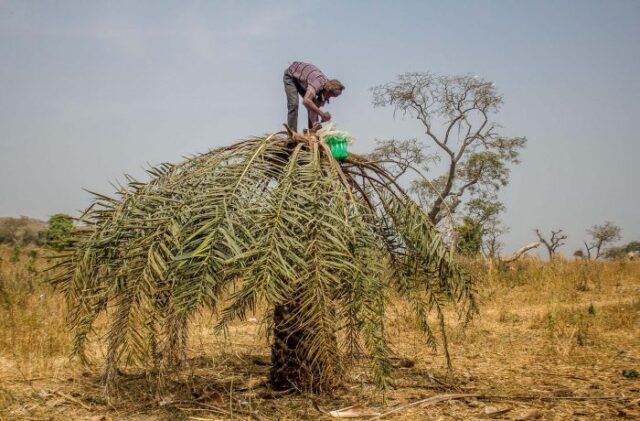
In 1952, Nigerian author Amos Tutuola published The Palm Wine Drinkard, a book based on Yoruba folktales. Now a canonical piece of African literature, the book has been translated into 12 languages.
Its initial reception internationally may have disclosed more about Western reviewers than the work itself.
The book’s first critic, Dylan Thomas, in his 1952 review in The Observer, described it as “simply and carefully” written in “young English.”
In 1953, The New York Times Book Review described Tutuola as “a true primitive” whose world had “no connection at all with the European rational and Christian traditions.” The New Yorker’s 1953 review stated that Tutuola was “being taken a great deal too seriously” and instructed U.S. writers not to imitate him, as “it would be fatal for a writer with a richer literary inheritance.”
Such criticism aside, the book is about someone who sets out to retrieve his palm wine tapper from the land of the dead. It condenses several cultural folktales that use palm wine to explore themes of brotherhood, communal love and familial identity. It demonstrates how thick the palm wine bond is in Nigeria.
To make palm wine, tappers climb insanely tall palm trees, balancing support ropes on their waist. Once at the tree’s crown, they insert a tube which slowly brings the sap out into a keg or calabash that’s secured tightly against the tree. After about half a day, the palm wine tapper returns to collect the sap.
The sap begins to ferment as soon as it leaves the tree, catalyzed by yeasts. The more time that passes, the more fermented it becomes and the higher its alcohol content.

“For Nigerian cultures, the palm wine is a tool of social cohesion,” says Justus Aboyeji, a Ph.D of history and international studies at the University of Ilorin. The drink is served during casual visits and gatherings, and it has more formal usages in coronations and festivals.
It’s mostly served at room temperature in gourds, poured directly from the calabashes. Depending on preference and how long the palm wine has been tapped, its alcohol by volume (abv) ranges from 2% to 15%.
In the Igbo tradition, spousal relationships are not considered solid until the suitor brings palm wine to the father of whomever they’re pursuing. Elders bless the palm wine, which is then enjoyed by the couple.
The wine is tapped from all palm tree varieties: the oil palm, raffia palm and date palm. Wine made from oil and raffia palms is typically most popular.
The Yoruba consider wine tapped from raffia palms emu ogidi (meaning “real wine”), while those made from the sap of other types of palms is emu oguro (“adulterated wine”). Among Igbos, wine made from oil palms is more esteemed.
In other Nigerian cultures like the Ijaw and Urhobo, palm wine is distilled up to 40% abv to make a gin-like liquor called ogogoro.
“Why would you drink palm wine alone?” —Segun Lawal, owner, Vibe
Palm wine has survived urbanization in Nigeria, retaining both its social and cultural values. Local palm wine joints in rural areas have evolved into open bars and evening resorts fenced with bamboo. The gourd and calabash used previously to store and sip the wine have been exchanged for the keg and red cup, and tree shades have been replaced by resort canopies. But the palm wine tapper has not changed.
“Certain households are called ile elemu, literally translated as ‘the house of palm wine tapper,’” says Justus. Each morning, tappers set out from these houses with gourds tied to the tail of their vintage bicycles. They climb palm trees and cut into their bark in clean, measured strokes. Later, they eulogize the gods of the palm tree for that day’s bounty.
Palm wine also retains its social value. “Why would you drink palm wine alone?” asks Segun Lawal, owner of a palm wine spot called Vibe.
For Salako Francis, who says he first got drunk on palm wine when he was four years old, the drink endures because it provides brotherhood and friendship, plus a “link to pre-existing culture.”
An average palm tree yields less than a liter of sap per day. Due to deforestation, the amount of wine gathered by most tappers has diminished greatly in the last decade. Some tappers and sellers now water down their palm wine or alter it with artificial sugars and yeast.
“You can’t get the palm wine in its purest form [unless] you go to rural places, where even there’s the risk of dilution,” says Salako.
In the quest for authenticity and exclusivity, some of the wealthiest Nigerians do what the titular Palm-Wine Drinkard did in Tutuola’s novel: employ a tapper whose daily palm wine yields are sold only to them.
A popular Yoruba eulogy speaks to the ways palm wine’s importance exceeds its financial value: “The tapper taps in gladness / The mistress of tuppence, yet the chased millionaire into the forest / You are that which the horse drank / Drank till it forgot its horns.”
Source: WineMAg


 Tradition, Oppression and Resilience is in Every Pour of this Indian Spirit
Tradition, Oppression and Resilience is in Every Pour of this Indian Spirit




